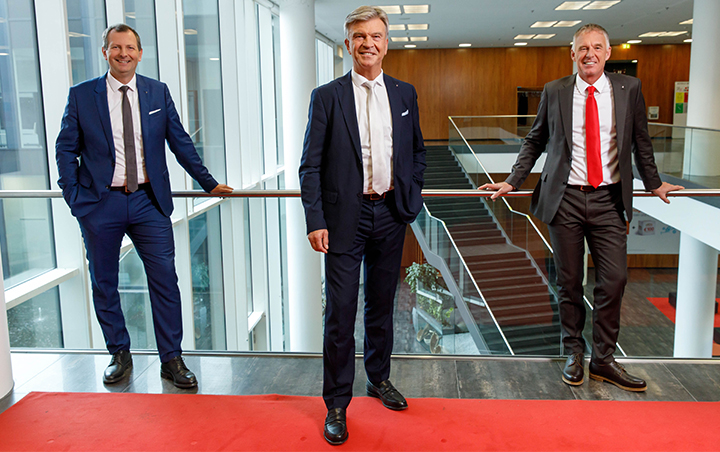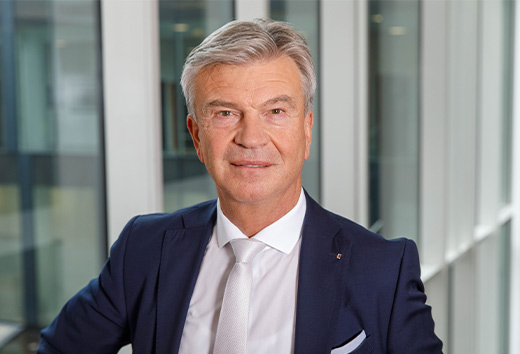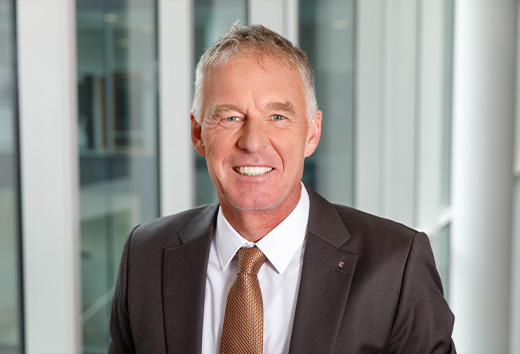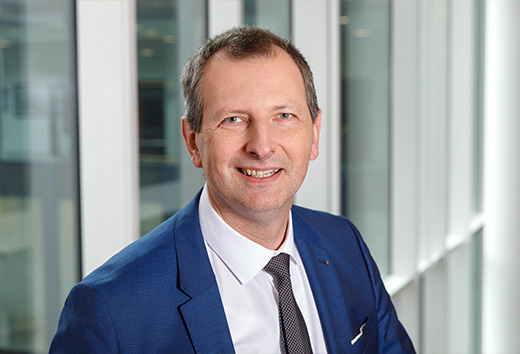
Dipl.-Ing. Stefan Stallinger MBA Member of the Management Board
Chief Executive Officer DDr. Werner Steinecker MBA Chairman of the Management Board
Dr. Andreas Kolar Member of the Management Board
The past fiscal year was again dominated by the COVID-19 pandemic. Have the challenges arising as a result of the health crisis changed over time?
Werner Steinecker: As an operator of critical infrastructure and a company providing essential public services, we have a special responsibility vis-à-vis society. With this in mind and as in the previous fiscal year, action was again taken to protect our interests that went beyond the usual standard of care. Despite all the lessons learned in the course of handling the crisis, the current situation continues to be very challenging, requiring a great deal of discipline and responsibility. This is the only way we can succeed in achieving our overriding goals of ensuring a reliable and uninterrupted supply of energy and water as well as data and waste management services. I would like to take this opportunity to thank each and every employee for their perseverance and their individual efforts to contain the pandemic.
“As an operator of critical infrastructure and a company providing essential public services, we have a special responsibility vis-à-vis society. Despite all the lessons learned in the course of handling the crisis, the current situation continues to be very challenging, requiring a great deal of discipline and responsibility. This is the only way we can succeed in achieving our overriding goals of ensuring a reliable and uninterrupted supply of energy and water as well as data and waste management services.”
The 2020/2021 fiscal year was one of the most successful in the company’s history, despite the ongoing COVID-19 pandemic. What would you attribute that to?
Andreas Kolar: We have indeed achieved an exceptionally good Group result, one which was not foreseeable during the budgeting period. The positive financial performance of the company in the 2020/2021 fiscal year is certainly due to the favourable development of electricity, gas and recycling material prices, which led to significant improvements in the results of the Energy and Waste Management Segments. I would also like to mention one-time effects, such as an impairment reversal in respect of the investment in Wels Strom GmbH on the back of a comprehensive strategy project, along with impairment reversals for waste incineration plants. Yet it is undoubtedly also the result of ongoing cost optimisation measures in the recent past, as well as being attributable to our integrated (and thus crisis-resistant) business model. Weather-related effects, such as the lower hydro coefficient of our hydropower plants and higher sales volumes due to cooler temperatures in winter and spring, largely offset each other.
“The positive financial performance of the company in the 2020/2021 fiscal year is certainly due to the favourable development of electricity, gas and recycling material prices, which led to significant improvements in the results of the Energy and Waste Management Segments. Yet it is undoubtedly also the result of ongoing cost optimisation measures in the recent past, as well as being attributable to our integrated business model.”
In July 2021, the National Assembly set the course for a sustainable energy future with its resolution on the legislative package for expanding renewables. How does Energie AG Oberösterreich contribute here?
Stefan Stallinger: The Group’s internal generation strategy is our way of outlining a clear path for expansion that underscores our ambitions when it comes to the energy transition. The plan is to provide 630 GWh of additional electricity from renewable energies by 2030, using both new and current, more efficient generation plants. Over half a billion euros is set to be invested in wind power plants, hydropower plants and photovoltaic systems, forming the basis for supplying an additional 180,000 households with regional green electricity while, at the same time, saving around 550,000 tonnes of CO2 annually. Energie AG Oberösterreich will also be promoting the use of waste, geothermal energy and industrial waste heat in heat production in the coming years – adding yet another way to efforts to achieve a future characterised by renewables. In addition to these measures, what is also required to fundamentally transform the energy system is that the grid infrastructure is expanded at all voltage levels, that additional storage capacity is created and that the gas grid is coupled with this sector and correspondingly integrated.
The pandemic has triggered a veritable boom in digitalisation – with all its advantages and disadvantages. Was Energie AG Oberösterreich prepared for this?
Andreas Kolar: Energie AG Oberösterreich committed to a digitalisation strategy several years ago, which has since gone on to form the basis for technological and process-related enhancements throughout the entire company. In our position as a broad-based service provider, it is important to have the highest possible standards of IT security for critical infrastructure and to be properly equipped to handle the dynamic market environment seen in many other areas of the company with the aid of flexible and, above all, effective IT systems. This is something that we already achieved well in the past through having a high degree of automation and it was also a crucial factor in our systems and staff being fully functional at all times during the COVID-19 pandemic.
Werner Steinecker: The fact that there was an early focus on digital customer solutions is reflected in our fibre-to-the-home (FTTH) activities. It has since become plain to see that our decision to focus on the promising area of fibre-optic technology was a good one. The growing demand for high data availability to meet the needs of home-schooling and working from home as well as for streaming and gaming services has led to a significant increase in active users – not least also due to the pandemic. Energie AG Oberösterreich already has a central role in the FTTH sector as the second-largest market player in Austria, a role which will certainly grow in the future by joining forces with the Province of Upper Austria to expand FTTH, the aim of which being to create optimal conditions for the comprehensive roll-out of fibre optics in Upper Austria.
“The Group’s internal generation strategy is our way of outlining a clear path for expansion that underscores our ambitions when it comes to the energy transition. The plan is to provide 630 GWh of additional electricity from renewable energies by 2030, using both new and current, more efficient generation plants.”
The E-Fairteiler app is another innovative tool created to enable customers to share solar power. How does this application work?
Werner Steinecker: Our innovation unit, Wertstatt 8 GmbH, together with Energie AG Oberösterreich Vertrieb GmbH, has developed a platform for sharing photovoltaic electricity by means of a very customer-oriented innovation process, making solar power accessible to everyone in a personal, transparent, flexible and, above all, regional way. The E-Fairteiler app allows owners of photovoltaic systems to sell, donate or exchange the locally generated photovoltaic electricity to customers without photovoltaic systems. On the other hand, every electricity consumer can purchase regional, renewable electricity, prioritise their local suppliers according to their individual needs and enter into price agreements with them. Energie AG customers were actively involved in its development and the prototype was successfully tested in a pilot region. The “Ökostrom E-Fairteiler” electricity product now available does not require any additional hardware, as it uses the data from the smart meter electricity meters.
In the past fiscal year, the preliminary project to construct the pumped-storage power plant in Ebensee was resumed. What were the primary reasons for this?
Stefan Stallinger: The Ebensee site basically offers a range of significant advantages given its topography, the associated high degree of efficiency and the existing grid connection, yet, due to the economic environment for the energy sector, the project’s economic viability has not been demonstrated up to now. Europe’s Green Deal, Germany’s plans to phase out coal and nuclear power, and Austria’s ambitious climate and energy strategy all mean that there is now a growing need for more high-performance storage capacities and flexible solutions. The current preliminary project involves preparing a detailed analysis of all economic and technical parameters, which will subsequently serve as a basis for any decision on whether to proceed with construction work.
There were frequent media reports last year of delivery delays and noticeable price increases due to a shortage of raw materials. To what extent were the technical organisational units affected?
Stefan Stallinger: The current situation comes with both advantages and disadvantages: On the one hand, the overheated market translates into higher prices for recyclables, a situation which our Waste Management Segment, for example, clearly benefited from, enabling it to achieve its best ever result. On the other hand, we are currently seeing high levels of operational pressure in current construction projects (due among other things to the noticeable increase in prices for various building materials), which we are only able to manage thanks to the excellent work of our employees. Overall, our integrated business model and the trend towards becoming a broadly diversified service company mean that financial market risks faced by the Group are significantly lower than in other similar companies. The high degree of regional value creation means that Energie AG Oberösterreich is less affected by technical-related supply difficulties than other industrial companies.
What challenges will this spell for the 2021/2022 fiscal year?
Andreas Kolar: The Group’s financial stability has proven resilient in the recent months, despite the protracted nature of the COVID-19 pandemic. Nevertheless, various uncertainties await us in the coming year, ones which certainly come with some not insignificant potential risks, specifically the impact of any further increase in inflation rates, high volatility in commodity price markets and a potential increase in bad debts as the government suspends COVID-19 support programmes. It is also important to be able to meet the high demand for human, material and financial resources in order to meet energy policy objectives and statutory requirements – while at the same time safeguarding the stability of the company’s development and the Group’s credit rating over the long term. We are confident of our ability to continue successfully mastering such challenges in the future.




